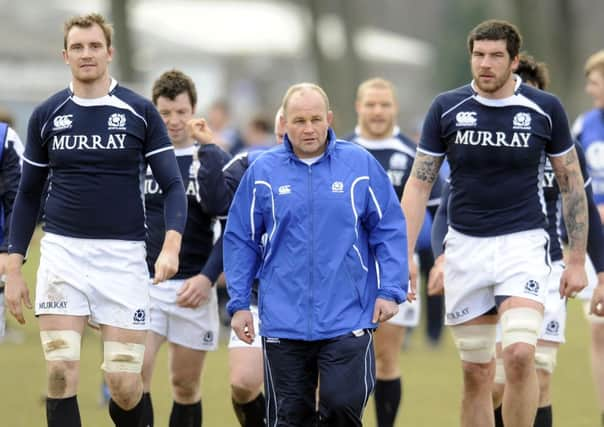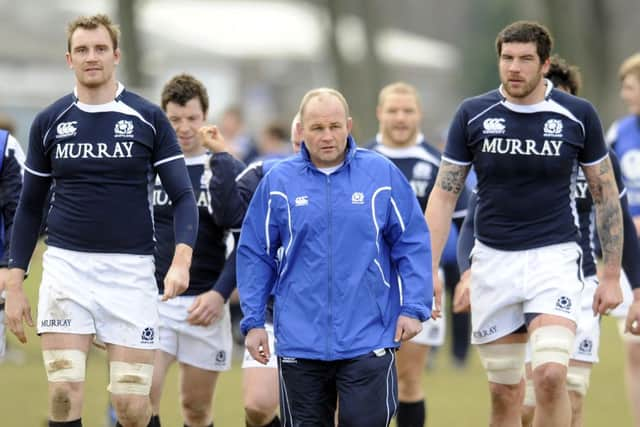Scots can be major force in 6 Nations - Robinson


That is the view of Andy Robinson, the former England World Cup-winning coach who came north to steer Scotland to what supporters hoped would be a new dawn of success. Having steered Edinburgh to second in the then Magners League, Robinson took over from Frank Hadden in 2009, but in three years he could not lift the team from its annual wooden spoon battles and just over a year ago he fell on his sword, quitting, thoroughly demoralised, after a humbling defeat by Tonga in Aberdeen.
A few months later he was hired to lead a new era at Bristol RFC, given a four-year contract and asked by Steve Lansdown, the owner of Bristol City FC and the rugby club, to build a club not only capable of returning to the English Premiership but pushing on to compete with the best European teams by 2017.
Advertisement
Hide AdAdvertisement
Hide AdIt is a challenge the former Bath legend is revelling in, his team currently sitting third in the Greene King IPA Championship, four points behind London Welsh and London Scottish, and in the mix for the play-offs.


But, how does he feel now about what he left behind in Scotland? He admits candidly that while he enjoyed his time north of the border, he left with regret that still aches, memories rekindled when he returned north for Bristol’s British & Irish Cup match with Gala. There were smaller disappointments and arguably greater, in the World Cup, but the Six Nations and his record of just two wins in three years seems to have left the most persistent pain.
“I really enjoyed my time with Scotland,” he states. “I met some great people, the supporters were fantastic and I really enjoyed working with the coaches and management team, but also the players. I got some huge pleasure out of the victories in Argentina, and against South Africa and Australia. To achieve that against top sides like that was great.
“My big disappointment was what happened in the Six Nations. To lose, and in the manner that we lost, because there were some close games, but not to achieve what I believed we could have achieved was a big disappointment for me.”
So, why could he not effect a turnaround? What was his side’s biggest failing? We had discussed it before sitting down for this interview, and looked at various things, but he is clear about the main hurdle to Scotland achieving success.
“It’s very much around the consistency of performance, and that’s in games as much as game to game,” he said. “You look at the recent performance against Australia, which was a really pleasing performance, but having played against South Africa the week before and conceded some cheap tries it’s about getting to those levels all the time.
“There are some quality players in Scotland with great attitudes. They are really good people. But it’s about delivering that performance every time you step up. We also saw that in the Heineken Cup this year, where they [Glasgow and Edinburgh] had great opportunities to win games, but weren’t able to achieve that [each time], and for everyone involved in Scottish rugby those are the frustrations that hit you.
“It’s the hope that kills you in the end because there are so many good signs there but it’s about winning the games.
Advertisement
Hide AdAdvertisement
Hide Ad“I was at the Australia game and thought that the team played very, very well. Watching the Six Nations last year and the great performance against Ireland and comfortable win against Italy showed what this side can do, but it’s about getting that consistency every time against the very best.
“The side has shown over the past few years that they can play very good rugby but it’s about finishing teams off, and that is in the players’ hands because they have the ability to do that. It’s about taking the right opportunities at the right times.”
We had discussed many times when he was here my belief that that inconsistency stems from a lack of exposure for Scottish teenagers to high-pressure games from the age of 16 years up, due to the small numbers playing and the lack of good, consistent competition across the country between the key ages of 16 and 20, where other nations are taking significant strides away from talented Scots, and leaving Scots to spend the years 20-24 trying to catch up.
When Robinson was Scotland coach the SRU did not employ an overseeing director of rugby – Graham Lowe lacked that kind of authority – but the man Robinson brought in, Scott Johnson, now has that office and is leading the creation of a new academy system across the four districts in Scotland, and a new focus on schools and club rugby that should improve grassroots development.
That will take time to bear fruit, but Robinson insists that Scotland is not without its gems at present and believes that the current squad has enough quality to make a serious bid for the RBS Six Nations title in 2014.
“There are good young players being developed in Scotland,” he said. “You only have to look at Edinburgh and Glasgow, where good young half-backs are being developed and it’s great to see Stuart Hogg at full-back, but the key is getting the 15 selected, or the 23, to understand how to win the games because they get into good positions and it’s the compounding of errors, three or four errors on the trot that concede seven to 14 points in international rugby.
“I constantly think back to the Wales game in 2010 when at 24-14 up going into the last ten minutes, and we ended up losing the game 31-24.
“I said to the team afterwards how delighted I was with the courage the team had played with, the way they had gone out and played, but we committed suicide in the end because we lost a game that we shouldn’t have lost, down to our own errors.
Advertisement
Hide AdAdvertisement
Hide Ad“You can look back in history at the number of times that has occurred [Scotland’s World Cup defeats by Argentina and England stand out], but as soon as Scotland can win a couple of those games the belief and the confidence will grow amongst the team.”
Robinson had plans for Scotland to take the England World Cup by storm. Plans now ripped up. He has new plans, for bringing respect and titles back to the West Country. That may prove a more straightforward task. But, still, he will be willing on many of Scotland’s current internationalists to prove the doubters, including those within the squad, wrong.
THE SCOTSMAN RUGBY SHOW IN ASSOCIATION WITH GINGER GROUSE